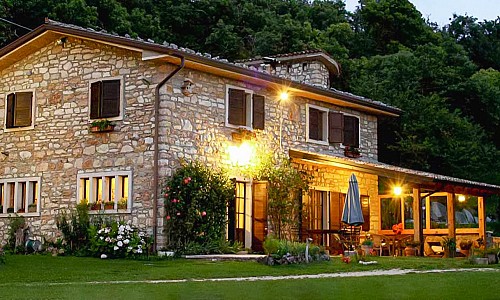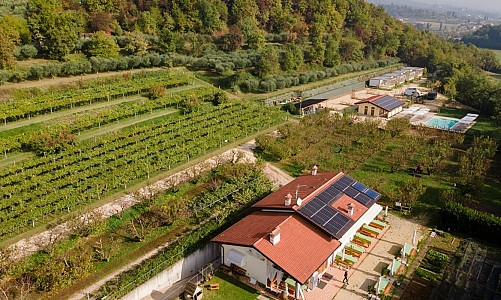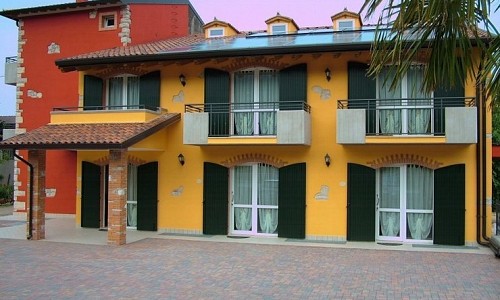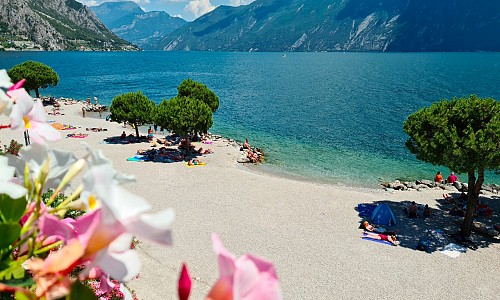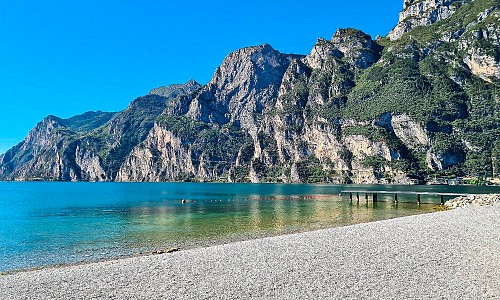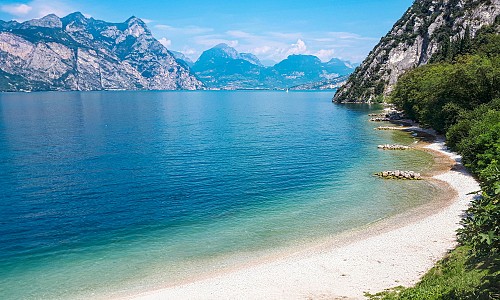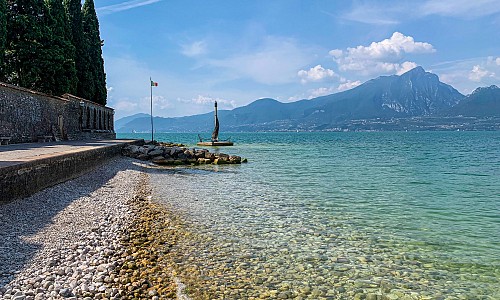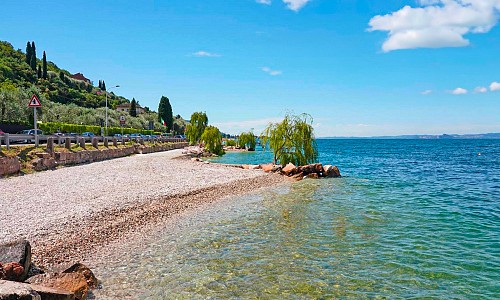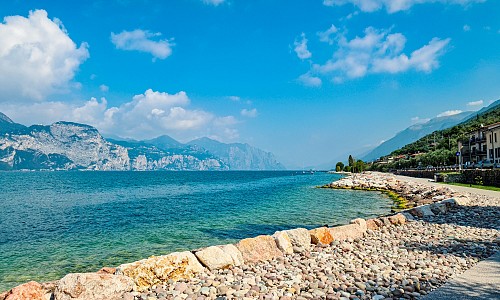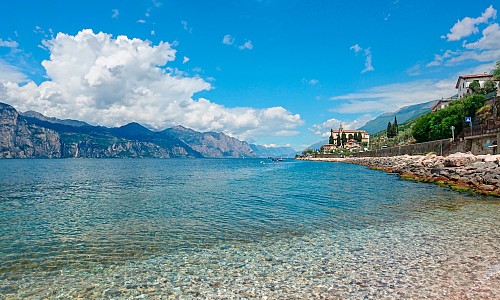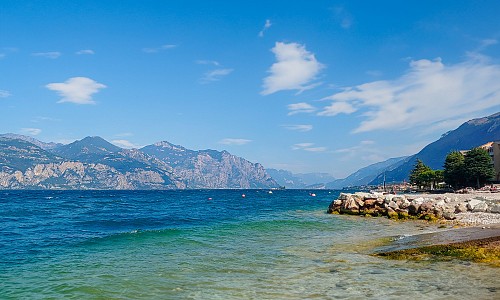The Scaliger Castle of Malcesine
- Category What see Lake Garda and Verona
What to do and see in Malcesine on Lake Garda.
Number of views: 9821Agriturismo - Where to stay overnight
(*Google Translate)
Malcesine
A visit to the Castle is not only about culture and relax as from the building you can have access to the most panoramic spots of Malcesine: from the platform called "Rivellino" or from the tower, you'll enjoy a 360 degree view you will never forget, that's for sure!
The 31 m high tower with its irregular pentagonal shape dominates Malcesine, raising at about 70 m above the lake.
A short guide
As you enter in the castle you can find the "Casermetta" on the left, where the castle's guard used to live. The lower ground floor and the ground floor host the Natural history museum. An external staircase leads you to the first floor where exhibits and wedding ceremonies are held.
The Natural history museum, was refurbished in May 2008 to offer visitors an original interactive multimedia approach turning the visit into a complete experience involving any of the five senses, in fact the guests can watch but also touch, smell, listen or use a touch screen.
The new set-up presents objects as works of art, shows and revisits themes, employs choreographies, including the landscape that the visitors can see from the windows.
At the end of the courtyard, there's a small balcony, placed at 24 m of height offering a wide and suggestive view of both the lake and the surrounding mountains.
Going up on a flight of stairs, there's the gunpowder magazine built up by the Austrians. Today this area has been turned into the Goethe room, where the sketches of the Lake and of the castle drawn by the author during his Italian Journey are displayed. Goethe reproduced in his drawings the authentic colours of the landscape which became the starting point for his "Theory of colours". Outside, in a contemplative corner of the small garden, there's the poet's bust.
From here, going further up, you get to the second courtyard, called Rivellino, where you can admire the town, the lake and the western side of Mount Baldo.
Civil wedding ceremonies are held at Rivellino.
Down the stairs, on the eastern wall there are a few traces of a fresco which probabaly belonged to an old Scaliger chapel.
A large space called "Lacaòr", which is probably one of the most ancient protohistoric settlement in Malcesine, is situated right past the front gate. During the summer this area is used as an open air theatre with 400 seatings.
Admission to this part of the castle is allowed only during the shows.
The third courtyard is the highest and the northermost of the all building, you can reach it going up on a flight of stairs and past the Scaliger gate. In the ancient times, there used to be a stair leaning against the western wall of the Scaliger residence to have access to this side. Today the entry is still visible but it is blocked by an iron grating.
Passing through the Scaliger gate, after a short flight of stairs, there's a well. On the left, in the northern-east corner of the square underlying the tower, a fresco representing the Virgin with the child could probably testify the presence in the past of an ancient chapel.
A stair built by the Austrians but recently adapted, goes up directly from the well to the conference room of the Scaliger residence and to the tower.
Next to the well, in the courtyard, there's a direct access to the ground floor of the residence, where a Museum of local history is going to be set up incorporating the Museum of the Venetian Galleys. The facility displays the renowned transport of the ships from the land and the attempt to pull out a Venetian galley sunk into the lake in front of the port of Lazise.
picture of the museum under the castle stair
Under the floor there are two well-lighted compartments defined by two balustrades: according to some sources they could represent the access to the castle's dungeons, but there is no concrete proof of this theory yet.
On the contrary, the underground connection between the two compartments and the tower is certain as a passage was discovered following the opening of the trapdoor on the floor of the first room of the tower.
To get to the upper floor where you can find the Conference room and the access to the tower, you need to get out on the square and then go up the stairs. The conference room was inaugurated in 1989, housing about 150 people and hosting exhibits, conventions, university courses and wedding ceremonies.
Finally you enter inside the Tower: an open door oriented toward the north leads you into the first room, while earlier you had to pass through the external bridge.
A window with a grating in the western side indicates the access to the aerial bridge. This was the real height of the tower, which was built by the Longobards as you can see from the different materials and the building style.
The ascent to the tower begins right in front of the entry. In the upper floor, there are five rooms open and on the penultimate floor there was a graffito which has been removed showing a name "Corrado II" and a date "1131": these signs can reveal that this part of the tower was completed in that year.
The fifth room was named "Revenge room": the room which was formerly covered with wall shingles, has 6 windows on an 80 cm-thick wall. In 1909 concrete was employed to cover the floor and a town bell dating back to 1442 was placed in the middle. The room also shows impressions of the old town coins.
A short historical overview
The fortress of Malcesine dates back to the last centuries of the first millenium B.C. even if some other well-founded sources maintain that the first to build the castle were the Longobards around the half of the first millenium A.D.
The castle was destroyed by the Franks in 590 A.D. and then rebuilt. In 806 the building hosted king Pepin, who came to Malcesine to visit the Saints Benigno and Caro and, after the Hungarians invasions, it was included in the episcopal feud of Verona.
It was under Alberto della Scala's and his family's control from 1277 to 1387.
During this period the Scaliger renovated the fortress which started to be referred to as "Scaliger castle" and it was occupied by the House of Visconti from 1387 to 1403.
Two years later, it was incorporated into the dominion of the Republic of Venice and remained under its control until 1506 when it was conquered by the Empire. The castle changed hands several times: it was owned by the Republic of Venice once again from 1516 to 1797, then by the French, followed by the Austrians which accomplished significant strengthening works inside the building and remained here from 1798 to 1866.
From that year on, it became a Venetian's ownership.
On 22 August 1902 the castle was declared a national monument.
Contacts and information
Scaliger Castle of Malcesine
Via Castello, 39
T: 0039 045 6570333
➡️ visitmalcesine.com
Malcesine (video):
Where to stay overnight:




